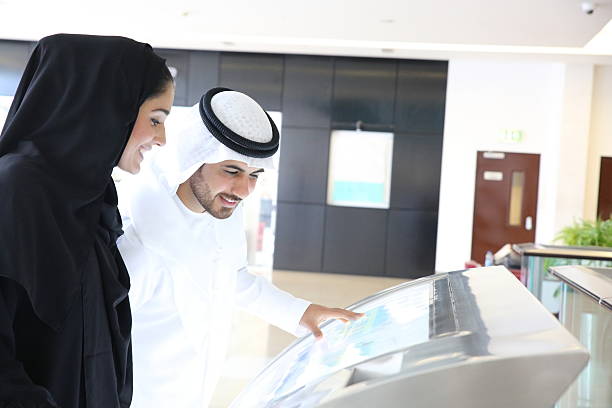Abstract
As the world continues to advance in the digital era, the focus on efficient and collaborative workspaces becomes increasingly vital. This article explores the future trends of digital workspaces, specifically examining the evolution of intranets and extranets in the context of Qatar's business landscape.
Introduction
In Qatar, a nation at the forefront of technological innovation, the future of digital workspaces is a compelling topic. This article delves into the anticipated trends in intranets and extranets, shedding light on how these digital tools are set to redefine the way businesses collaborate and operate.
Current Landscape of Digital Workspaces in Qatar

Qatar's business environment has witnessed a rapid transition towards digitalization. Intranets, serving as internal communication platforms, have become commonplace. Extranets, on the other hand, have gained traction for secure collaboration with external stakeholders. Understanding the present state provides a foundation for exploring future trends.
Anticipated Trends in Intranets and Extranets
Integration with Artificial Intelligence
The future of intranets in Qatar involves a seamless integration with artificial intelligence (AI). Intelligent algorithms will enhance search capabilities, automate routine tasks, and provide personalized user experiences, thereby revolutionizing how employees access and interact with information.
Mobile-First Approach
With the rise of remote work, intranets in Qatar are expected to adopt a mobile-first approach. Responsive designs and dedicated mobile apps will enable employees to access the intranet from anywhere, fostering a flexible and agile work environment.
Blockchain for Enhanced Security
The future of extranets in Qatar revolves around heightened security measures, with the integration of blockchain technology. This ensures a tamper-proof and transparent system, addressing concerns related to data integrity and confidentiality in external collaborations.
Augmented Reality for Collaborative Experiences
In the Qatari business sphere, extranets are poised to embrace augmented reality (AR) for collaborative experiences. Virtual meetings, immersive project planning, and interactive training sessions will become integral components, transcending geographical boundaries.
The Synergy of Intranets and Extranets

The future workspace in Qatar will witness a seamless synergy between intranets and extranets. Unified digital platforms will break down silos, enabling both internal and external collaborators to work cohesively. This integration aims to streamline communication, enhance project management, and elevate overall productivity.
Tailoring Solutions to Qatar's Business Culture
Before implementing digital workspaces, businesses in Qatar should conduct a thorough assessment of their unique organizational culture and requirements. Tailoring solutions to align with local business practices ensures a smoother transition and greater user acceptance.
Regulatory Compliance
Given the importance placed on data security in Qatar, businesses must ensure that their digital workspaces comply with local regulations. Adhering to data protection laws and industry-specific compliance standards is paramount for maintaining trust and integrity.
Choosing the Right Platform
Scalability and Flexibility
Selecting a digital workspace platform with scalability and flexibility is vital for accommodating future growth and adapting to changing business needs. The chosen platform should seamlessly integrate with existing systems and support evolving technological trends.
User-Friendly Interface
Ensuring a user-friendly interface is essential for encouraging widespread adoption among employees. Intuitive navigation, clear functionalities, and responsive designs contribute to a positive user experience, ultimately enhancing overall productivity.
Security Measures

Multi-Factor Authentication
Incorporating multi-factor authentication (MFA) adds an extra layer of security to digital workspaces in Qatar. This safeguards against unauthorized access and reinforces the protection of sensitive information.
Regular Security Audits
Conducting regular security audits is a proactive measure to identify and address potential vulnerabilities. This ongoing assessment ensures that the digital workspace remains resilient against evolving cybersecurity threats.
User Training and Support
Comprehensive Training Programs
Investing in comprehensive training programs is essential to equip employees with the necessary skills to navigate and utilize digital workspaces effectively. Training should encompass both technical aspects and best practices for optimal use.
Dedicated Support Channels
Establishing dedicated support channels ensures that employees have assistance readily available when encountering issues or requiring guidance. A responsive support system contributes to a smoother transition and fosters user confidence.
Keeping Pace with Technological Advancements
Digital workspaces in Qatar must stay abreast of technological advancements. Regular updates and maintenance are imperative to incorporate new features, enhance security protocols, and address potential system glitches.
Monitoring Usage Patterns
Monitoring usage patterns provides valuable insights into how employees interact with the digital workspace. This data can inform future updates, ensuring that the platform evolves in tandem with the changing needs of the workforce.
Integration with Local Communication Preferences
Multilingual Support
Given the multicultural nature of Qatar's workforce, incorporating multilingual support within digital workspaces is imperative. This ensures inclusivity and seamless communication among employees who may prefer different languages, contributing to a harmonious work environment.
Cultural Sensitivity
Understanding and incorporating cultural nuances into digital workspaces is vital. Features and communication styles should align with local customs and business etiquette, fostering a collaborative and respectful workplace culture.
Virtual Collaboration Tools
Enhancing digital workspaces in Qatar involves integrating advanced collaboration tools such as virtual whiteboards, interactive project management platforms, and augmented reality meeting spaces. These features facilitate more immersive and effective collaboration, especially in a remote or hybrid work setting.
Real-time Translation
To overcome language barriers and enhance communication, implementing real-time translation features can be beneficial. This ensures that all team members, regardless of language proficiency, can actively participate in discussions and contribute meaningfully.
Embracing Qatar's Technological Infrastructure

Seamless Integration with Local Technologies
Digital workspaces should seamlessly integrate with Qatar's technological infrastructure. This includes compatibility with local cloud services, ensuring efficient data storage and accessibility, and leveraging the high-speed connectivity offered by Qatar's advanced telecommunications networks.
Mobile Accessibility
Given the prevalence of mobile device usage in Qatar, ensuring mobile accessibility for digital workspaces is crucial. This allows employees to stay connected and productive while on the move, aligning with the country's dynamic and fast-paced business culture.
IoT Integration
Aligning digital workspaces with Qatar's vision for smart cities involves incorporating Internet of Things (IoT) integration. Smart sensors and devices can enhance workplace efficiency, automate routine tasks, and contribute to a more sustainable and technologically advanced business environment.
Data Analytics for Informed Decision-Making
Implementing robust data analytics tools within digital workspaces enables businesses to make informed decisions. Understanding employee engagement, workflow patterns, and collaboration trends empowers organisations to continuously optimise their digital workspaces.
Conclusion

In conclusion, the future of digital workspaces in Qatar is an exciting journey into enhanced collaboration and productivity. The anticipated trends in intranets and extranets reflect the nation's commitment to staying at the forefront of technological advancements. By following best practices in planning, platform selection, security measures, user training, and maintenance, businesses can unlock the full potential of digital workspaces. Integrating features that enhance communication, collaboration, and cultural sensitivity can help businesses create a workspace that resonates with Qatar's dynamic and forward-thinking business environment.
FAQs
Q1: How will AI integration benefit intranets in Qatar?
A: AI integration in intranets will enhance search capabilities, automate tasks, and provide personalised user experiences, fostering efficiency and innovation.
Q2: What security measures are expected in the future of extranets in Qatar?
A: Extranets in Qatar are anticipated to integrate blockchain technology for enhanced security, ensuring a tamper-proof and transparent collaboration environment.
Q3: How will the synergy of intranets and extranets impact Qatari businesses?
A: The synergy between intranets and extranets will streamline communication, enhance project management, and elevate overall productivity in Qatari businesses.
Q4: Are mobile-first intranets a response to the rise of remote work in Qatar?
A: Yes, the adoption of a mobile-first approach for intranets in Qatar responds to the increasing trend of remote work, providing flexibility and accessibility for employees.
Q5: What role will augmented reality play in collaborative experiences through extranets in Qatar?
A: Extranets in Qatar are expected to incorporate augmented reality for virtual meetings, immersive project planning, and interactive training, enhancing collaborative experiences.
Q6: How can businesses in Qatar prepare for the future of digital workspaces?
A: Businesses in Qatar can prepare by staying informed about emerging technologies, fostering a culture of digital literacy, and investing in adaptable and integrated digital workspace solutions.
Tags:
Gulf News